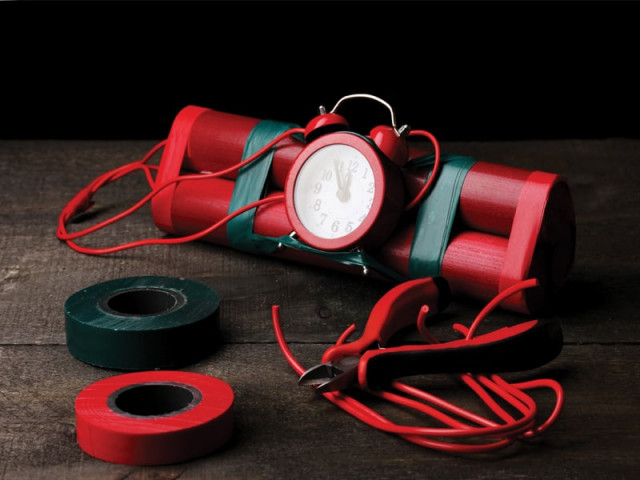Another bomb gets thrown Karachi’s way - this time, its magnetic
Police believe only two blasts using this explosive device have ever taken place in the city.

Authorities believe that the bomb used in the killing of Farhan Khalil was a magentic one. PHOTO: FILE
A similar blast took place in January when a low intensity bomb exploded in a car parked at the petrol pump station adjacent to Askari IV on the Rashid Minhas Road, killing the man in the backseat.
“Both these cases are the same as magnetic devices were used. Other than that, magnetic bombs have never been used in Karachi,” said SSP Raja Umer Khattab, the chief of the Counter Terrorism and Financial Crime Unit of the Crime Investigation Department. Investigators, however, have been unable to identify the man who was killed in the blast at the pump. “It seems that the person who was killed at the pump was the target but we are still unclear on who he was and who was targeting him.”
Tracing the source
In a raid conducted in 2004 at Harkatul Mujahideen al-Alami’s (HuMA) hideout in Kalakot, Lyari, the Crime Investigation Department found evidence which suggested that the organisation was making these bombs. The raid was conducted on the information provided by the organisation’s Kamran aka Kamran Atif, who was arrested in 2004 from Federal B Industrial Area. Kamran Atif has been reportedly involved in several cases of major terrorism acts, including the attack on the US Consulate in Karachi and the foiled attack on former president of Pakistan, Pervez Musharraf.
Following his arrest, more than half a dozen of his companions were also captured but released from jail. Kamran Atif is still serving time for life imprisonment.

“They had set up their bomb making laboratory in Kalakot from where we found different kind of magnetic bombs,” said SSP Khattab. He, however, could not say for sure if the organisation was behind the recent two blasts. “HuMA is an anti-state group, which targeted security forces and high-value personnel - maybe their strategy has changed over the years,” the SSP explained. “HuMA or not, if people start using these magnetic devices then it will prove very dangerous.”
On the other hand, CID SSP Fayyaz Khan told The Express Tribune that several other banned outfits, including Jundullah and Lashkar-e-Jhangvi, also possess the expertise for making such bombs. “Remote control or timers are used in such devices,” he explained. “The terrorists prefer using remote controls as they can target their mark accurately. There is more room for mistake with timer.” In Khalil’s case, there has been no progress as police are still trying to ascertain the motive behind the incident. The footage from the cameras was also no help as Khalil’s car was not in the camera’s range.
Farhan Khalil’s funeral
The deceased was laid to rest on Wednesday at the Yasinabad graveyard in Azizabad. A clash between the funeral participants and the residents of Hussain Hazara Goth started when the former searched the area and the latter objected. A leader of the Pakistan Muslim League-Functional, 24-year-old Nadeem Magsi, was killed, while his companion and three Muttahida Qaumi Movement’s workers were injured.
Published in The Express Tribune, March 21st, 2013.



















COMMENTS
Comments are moderated and generally will be posted if they are on-topic and not abusive.
For more information, please see our Comments FAQ